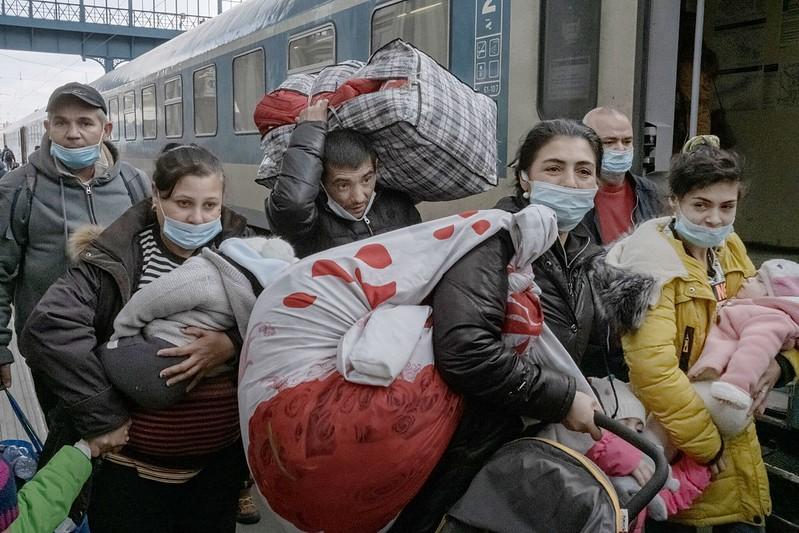Two reports published last week in Eurosurveillance show an increase in multidrug-resistant organisms (MDROs) in countries that have taken in refugees and hospital patients from Ukraine.
The reports from the Netherlands and Germany show a significant rise in MDROs in both countries starting in March, shortly after the Russian invasion of Ukraine, with many isolates collected from patients who had fled from or were evacuated from hospitals in Ukraine. Among the MDROs reported were bacteria harboring carbapenemase-producing New Delhi metallo-beta-lactamase (NDM) genes, which confer resistance to most antibiotic classes.
Since the beginning of the war, tens of thousands of refugees have fled to neighboring countries from Ukraine, which has reported higher rates of multidrug resistance in recent years than other European countries. Concerns about the possible spread of MDROs prompted the European Centre for Disease Prevention and Control in March to recommend that hospitals screen for MDROs in patients transferred from Ukrainian hospitals or with a history of hospital admission in Ukraine.
Both Eurosurveillance reports suggest healthcare providers in these countries should be aware of the presence of theses microorganisms when treating hospitalized patients from Ukraine, and that hospitals treating Ukrainian patients should tighten infection prevention and control (IPC) measures to prevent spread of the pathogens.
More notifications of multidrug-resistance genes
In the Dutch report, researchers with National Institute for Public Health and the Environment and Erasmus University say that, from Mar 1 to Aug 31, 47 carbapenemase-producing Enterobacterales (CPE), 12 carbapenemase-producing Pseudomonas aeruginosa (CPPA), 3 carbapenem-resistant Acinetobacter baumannii (CRAB), and 13 methicillin-resistant Staphylococcus aureus (MRSA) isolates from patients originating from Ukraine were submitted to the national surveillance system. These isolates represented 21%, 52%, and 1.2% of all CPE, CPPA, and MRSA isolates, respectively, that were submitted during the period.
The isolates were considered Ukraine-associated if the epidemiologic questionnaire indicated the patient had been recently hospitalized in Ukraine, had contacted with a Ukrainian hospital, or had visited Ukraine in the year prior to sampling. About half of the Ukrainian patients had recently been hospitalized in Ukraine.
The authors note that, under the Netherlands' mandatory CPE notification system, 58 CPE notifications were reported in August 2022, compared with an average of 23 in previous months of 2022 and 28, 12, and 28 in 2019, 2020, and 2021, respectively. Of the 38 patients with CPE who reported travel and/or hospitalization abroad, 9 (23%) were from Ukraine.
Of the 62 CPE, CPPA, and CRAB isolates from 44 Ukrainian patients that underwent genomic analysis, 60% contained NDM genes, 28% harbored combinations of two different carbapenemase genes, and most represented globally spread epidemic lineages. The percentage of isolates with carbapenemase genes in Ukrainian patients was twice that found in isolates from Dutch patients.
"Healthcare professionals should be aware of the possible presence of these microorganisms when treating hospitalised patients from Ukraine and take adequate infection prevention measures to prevent the spread of these MDRO," the authors wrote.
Concerns about hospital spread
Similarly, in the German report, researchers from the Robert Koch Institute and the German National Reference Centre for Multidrug-resistant Gram-negative Bacteria note that, after a period of reduced incidence since the beginning of the COVID-19 pandemic, notifications of NDM-producing Klebsiella pneumoniae in Germany since March have exceeded pre-pandemic trends.
Analysis of these notifications revealed that presence in Ukraine before diagnosis was common. Of the 335 notifications since March, 80 (24%) were in Ukrainian refugees or patients evacuated from Ukrainian hospitals, compared with only 1 of 584 notifications received from 2017 through 2021. In 75 of the NDM notifications, the carbapenemase gene specified was NDM-1; prior presence in Ukraine was reported for 24 (32%) of the 75 NDM-1 notifications.
Genomic analysis of a sampling of isolates that prioritized cases from Ukraine also revealed multiple K pneumoniae sequence types, including epidemic clones, and a higher number of isolates carrying NDM-1 and the OXA-48 carbapenemase genes. The results also hinted at the possibility of onward transmission in German healthcare facilities.
"Our findings suggest an elevated proportion of NDM-1 and NDM-1/OXA-48-producing K. pneumoniae among refugees or evacuated patients from Ukraine, adding to the baseline incidence in Germany," the authors wrote. "We need to further investigate if high transmission occurs in single or multiple treatment centres in Germany or Ukraine to specifically assess how best to support IPC and outbreak control."
























